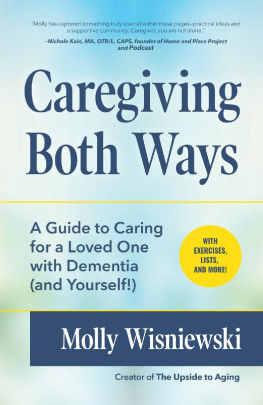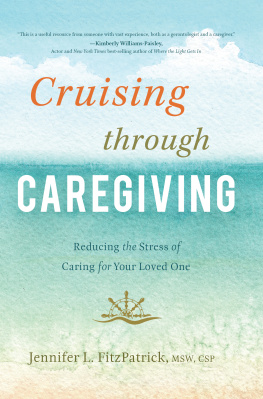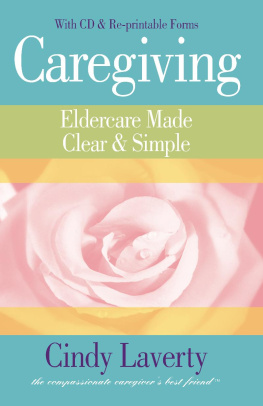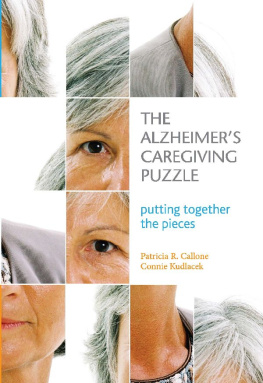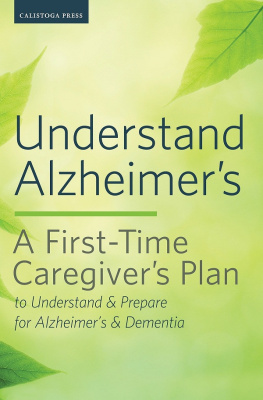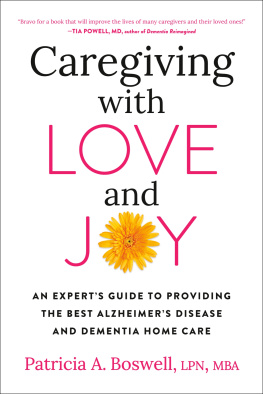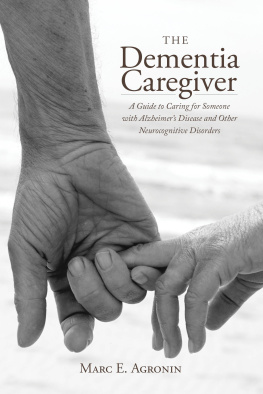Caregiving Both Ways
Caregiving Both Ways
A Guide to Balancing It All While Caring for a Loved One with Dementia
Molly Wisniewski

Mango Publishing
Coral Gables
Copyright 2019 by Molly Wisniewski
Published by Mango Publishing Group, a division of Mango Media Inc.
Cover Design: Roberto Nez
Cover Photo/illustration: TierneyMJ (Shutterstock)
Layout & Design: Jayoung Hong
Mango is an active supporter of authors rights to free speech and artistic expression in their books. The purpose of copyright is to encourage authors to produce exceptional works that enrich our culture and our open society.
Uploading or distributing photos, scans or any content from this book without prior permission is theft of the authors intellectual property. Please honor the authors work as you would your own. Thank you in advance for respecting our authors rights.
For permission requests, please contact the publisher at:
Mango Publishing Group
2850 S Douglas Road, 2nd Floor
Coral Gables, FL 33134 USA
For special orders, quantity sales, course adoptions and corporate sales, please email the publisher at or +1.800.509.4887.
Caregiving Both Ways: A Guide to Balancing It All While Caring for a Loved One with Dementia
Library of Congress Cataloging-in-Publication number: 2019941763
ISBN: (print) 978-1-63353-984-6, (ebook) 978-1-63353-985-3
BISAC category code: MEDICAL / Caregiving
Printed in the United States of America
To my husband, Kevin: You are my favorite person, and I appreciate your continued enthusiasm an d support!
Table of Contents
By Carol Bradley Bursack, Minding Our Elders
Every caregiver has a unique story to tell, most often one of jumbled emotions that cycle through times of joy, despair, grief, and gratitude. My decades-long journey was a juggling act that was, while also unique to my circumstances, no different when it came to emotions.
For me, caregiving began with my neighbor, Joe, who had lived with Menieres disease since his thirties and, as a result, was completely deaf. When Joe was in his eighties, his wife died. That left him alone except for some older friends from his working years and his only adult child, who lived across the country. We hadnt socialized before, other than giving a wave and saying hi, because Joe seemed busy with his life and I had a young family. But now? How could a neighbor not offe r to help?
Back then, my children were young. Over time, we grew to love Joe, but, as I crossed our yards that first day to see if I could do anything to comfort this seemingly vulnerable older man, I had no way of knowing that I was entering into an unspoken contract to be Joes caregiver for the next five years. Still, I dont see that I could have done things differently, and I wouldnt have wanted to miss those years, even if Id had the chance to d o it over.
During my Joe years, as I call them, my aunt and uncle, who had no children, moved from the Washington, DC, area to be near my family. They even moved into the same apartment complex as my parents. We were all close, and my siblings and I were my aunt and uncles substitute kids, so this was the natural progressio n of life.
For a few years, life was good for all of my family elders. They even took a couple of cruises together. Meanwhile, I was busy with young children and Joes needs. We visited my parents, aunt and uncle, and in-laws regularly and did an occasional favor, as any adult child would do, but I wasnt needed then as a caregiver.
Then, shortly after Joes death, my uncle had his first stroke, which seemed to trigger a chain reaction when it came to my familys elder health. My trips to emergency rooms, doctors offices, and even the occasional hospital room rapidly increased as one by one each elder entered what was, for them, going to be years of poor health. Looking back, I can see that this was the beginning of the end for them all, even though life as such would go on for most of them for more than a decade.
This is what I call the sneak-up effect of caregiving. I handled each crisis as a unique occurrence that I needed to deal with. Yet, with each health emergency, my overall involvement grew. I was deeply involved before I understood that there was no going back, even if Id chosen to do so. My uncles strokes introduced us to in-home health care. My moms less than stellar second hip replacement offered me one of my first experiences of personally providing daily care for an elder. It was, however, my dads disastrous brain surgery that truly changed all of their lives and made me the caregiver that I wou ld become.
Dad had suffered a brain injury in the service during World War II. Still, after weeks in a coma and much therapy, he went on to lead a successful life in public health. Decades later, the injury came back to haunt him, and fluid began to build up behind the scar tissue in his brain. There were few signs of any cognitive issues when Dad saw the doctor, but still, he rightly recommended surgery to place a shunt in Dads brain in order to drain what would eventually become increasing amounts of built-up brain fluid into his abdominal cavity. This is a common procedure thats often used for people who have suffered brain injuries, or who develop fluid as they age. Its most often safe and effective. Until it isnt.
Dads situation, sadly, was one of those times where the surgery, while technically successful, was a disaster. He came out of that operation with severe dementia, something that hed live with for the final decade of his life.
Meanwhile, my other elders were beginning to experience health emergencies. My uncle continued having strokes. My aunt collapsed, was hospitalized, was found to be full of cancer and, within weeks, was dead. My father-in-law began to grow frail and suffer small strokes. Eventually, he had one major stroke that hospitalized him, and then kept having strokes unti l he died.
My mother-in-law, who at the time of her husbands illnesses was having some cognitive issues, grew much worse. Over the course of time, I went to her condo daily and helped with meals, grooming, and other care, and kept her company. Eventually, she moved across the avenue from her condo into the nursing home where, at that time, my dad and un cle lived.
Meanwhile, my mother began falling regularly. At least once a week I would be summoned by an operator managing her emergency alert service. Id race to Moms apartment, where Id just been a couple of hours before, in order to handle the newest emergency, often by calling 911. Additionally, Moms overall pain worsened, and she began to show dementia symptoms.
After a few years of this routine, she too would join the others in the nur sing home.
Some ask why I didnt take one or another of my elders into my home. My answer to this question, which no one should ever ask, is this: I had five elders to care for at one time. Not only didnt I have the type of home to accommodate the needs of that many people, but I was also trying to care for a chronically ill son who was often home from school. When I wasnt with him, I was running from location to location to help my other elders who needed me. No one would have benefited from being shoehorned into my home when there were othe r choices.
The nursing home that we used, Rosewood on Broadway, was an excellent facility and near all of my elders when they needed it the most. Perhaps even more importantly, it was only two blocks from my home, as well, since I became the chauffeur for those who still lived in their own homes. Since I was still raising children, convenience was paramount. From the beginning, I was well aware that not everyone can find a conveniently located, wonderful facility for their multiple elders, so this stroke of good fortune was something for which Ive always been grateful.
Next page
